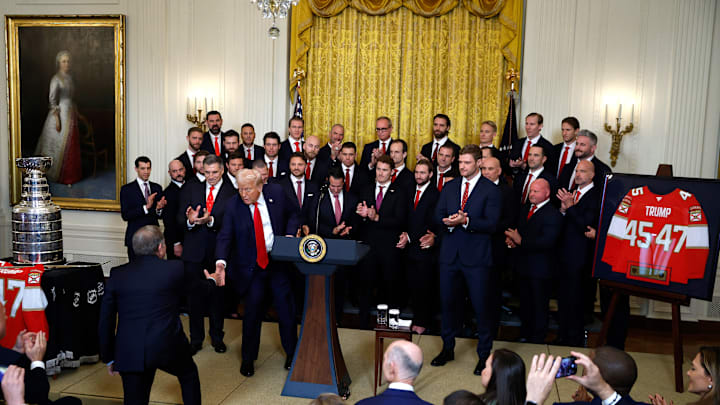Unless you live under a rock, you’ve realized the United States and Canada have become frenemies over the past few months. The good friends, allies, and neighbors have been engaged in a mini trade war that has the potential to affect both countries in big ways.
There are worries and concerns but at least for the time being the tangible aspects seem to be at bay although both sides are imposing tariffs (basically taxes on each other’s imports) on each other.
You’ve probably seen the booing of the respective national anthems when a team from the Great North plays a team from the land of bald eagles and apple pie. Although Major League Baseball and the National Basketball Association each have one club north of the border, the NHL is in a much different position.
The NHL has seven of its 32 member clubs north of the border and that accounts for 25% of league revenue. That makes the league much more sensitive to economic and currency issues between the neighboring countries. For example, problems with the Canadian dollar and economy were sighted as major reasons for the relocation of the Quebec Nordiques and original Winnipeg Jets, as well as why Canadian cities were passed over in the last round of NHL expansion.
This makes the league a very unique bellwether in the current state of both countries economic relations. Commissioner Gary Bettman expressed concern that if the “trade war” affected the value of the Canadian dollar against the United States dollar it could hurt league revenue and perhaps player salaries. Even if 25% of league revenue comes from Canadian it’s reported and players are paid in United States dollars.
The league’s economic concerns are very real. Interestingly they also seem to be benefitting from this economic Cold War.
The 4 Nations Face-Off was an astounding success that exceeded every expectation. The current state between the two countries added a passionate fuel to the fire. For ever anthem re-write and Trudeau tweet there was a funny “51st state” or “newest province” sign in the crowd.
The United States president wishing the national team success, a commonplace but usually uneventful occurrence in international competition, became breaking news. After Canada emerged victorious NBA analyst Charles Barkley jokingly apologized to Canada for the tariffs on the legendary TNT NBA broadcasts, further showing how the international tensions helped hockey go to the forefront of pop culture.
It’s hard to imagine the passion and interest not being the same if a Canadian team and American team meet in the playoffs. As of Tuesday morning, five of the NHL’s seven Canadian clubs are in a playoff spot. The other two, the Vancouver Canucks and Calgary Flames, are close enough that them making the postseason is a realistic possibility. Any American-Canadian playoff matchup becomes must see television. Let’s take it a step further and say we get a Canadian vs American Stanley Cup final like last season and interest might even surpass that of the 4 Nations Face-Off.
Bettman gave an interview to MSNBC and explained that league revenues are strong but added that there is some concern from sponsors over the two countries economic relations. That’s a stark contrast from what fans are seeing. In the post-COVID era the NHL has added the jersey patches and helmet ads to increase league revenue. It’s hard for fans to take Bettman saying “sponsors are concerned” seriously when fans are seeing more ads than ever.
One final little explanation that oversimplifies things: tariffs do not directly, keyword here is “directly”, affect hockey fans. If President Trump wakes up tomorrow and decides to increase Canadian tariffs again it doesn’t mean the cost of tickets to see your favorite team play the Montreal Canadiens next week will all of a sudden become more expensive.
It might been if you buy a Molson to drink instead of an American brew at the game it’ll cost more
If the things directly, keyword again “directly” affected by tariffs continue then eventually it will catch up to the NHL and it’s fans in an indirect way but that will take a little bit of time (for example, not this season).
The league is set to begin negotiations on a new CBA soon. Surprisingly the economic concerns between both countries don’t seem to be looming large. Both sides seem optimistic about the negotiations with Bettman saying neither side is looking at “fundamental” issues and NHLPA head Marty Walsh touting the great relationship the league and the players union currently have.
The league announced salary cap increases for the next three seasons, although Bettman said changes can be made “if necessary”. Believe it or not the Arizona Coyotes arena situation, if not resolved, might have been a more pressing issue in these meetings than Trump tariffs.
The league has always been worried about United States and Canadian economic differences so this is nothing new. The state of the league is strong, fans are spending money, and tickets are being sold. Unless those change this “trade-war” will most likely end up being background noise to hockey fans.
